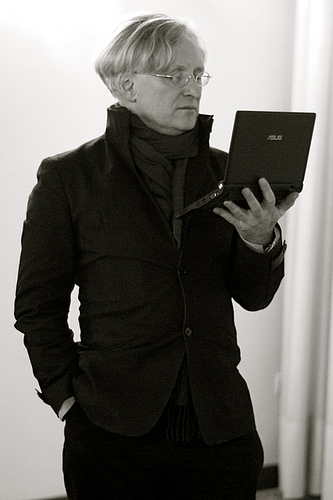
Twenty five years ago this November internet first started flowing into, and out of, NL and Europe.
Here at the CWI, in Amsterdam, in an office next to mine on the top floor.
I was probably the 4th or 5th user of the internet. Maybe the 6th.
It was a "Skunk works" project.
There was a 64kb/s connection between the whole of Europe and the whole of the USA... a year later to much rejoicing it was increased to 128Kb/s
You have probably heard of Moore's Law.
It's not actually a law.
In 1965 Gordon Moore predicted that integrated circuits would double in power each year at constant price 'for at least 10 years'.
In 1975 he adjusted that to a doubling every 18 months.
When you turn a tap on, you are adding a certain amount of water per minute to the bath.

So if we look at the graph of the bath filling, we get something like this:

We call this a linear function.
However, for instance, when a bank gives you interest on a bank account, it is not adding a fixed amount every year, but an amount based on how much you have in the bank.
For instance, if they offer a 3% interest, then every year your money gets multiplied by 1.03. If you have €1000 in your account, then at the end of the year you will have €1000 × 1.03, which is €1030. At the end of the second, you will have €1030 × 1.03, which is €1060.90.
Moore's Law is also a multiplication: a doubling every 18 months (which is 59% annual interest, if you are interested, or about 4% per month).
If we draw a graph of Moore's Law since 1988, it looks something like this:
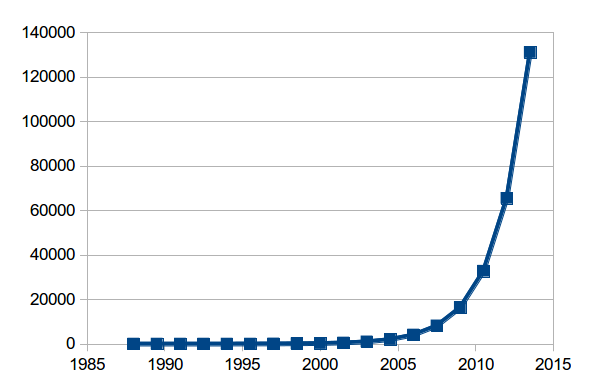
In other words, a computer now is around 130 000 times more powerful than in 1988.
We call this an exponential function.
If you look at this graph, it looks like almost nothing is happening until 2005, and then suddenly it shoots up like a rocket.
Some people, when talking about exponential functions like this talk about it "having passed the knee", meaning, it has finally taken off.
But I have some bad news.

If I draw the same graph, but only up to 2006, suddenly the knee appears to start around 1999.
There is no knee: it is an artifact of the scale you use.
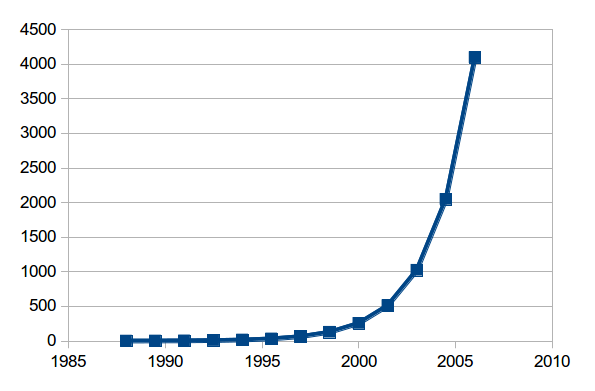
And that is why it is better to graph exponential functions in a different way.
On the vertical axis, rather than going in steps of 1, 2, 3, ... we use steps of 1, 10, 100, 1000, ... Then the exponential graph looks like this:
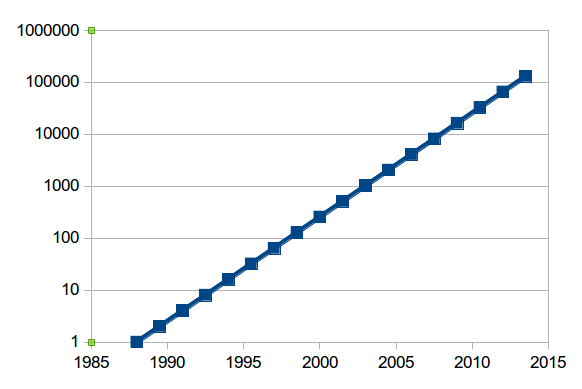
If you use a logarithmic scale, and the graph looks like a line, then it is exponential.
Of course, computers don't get exactly twice as powerful in exactly 18 months.
But I have been collecting data on the power of my computers since 1988.
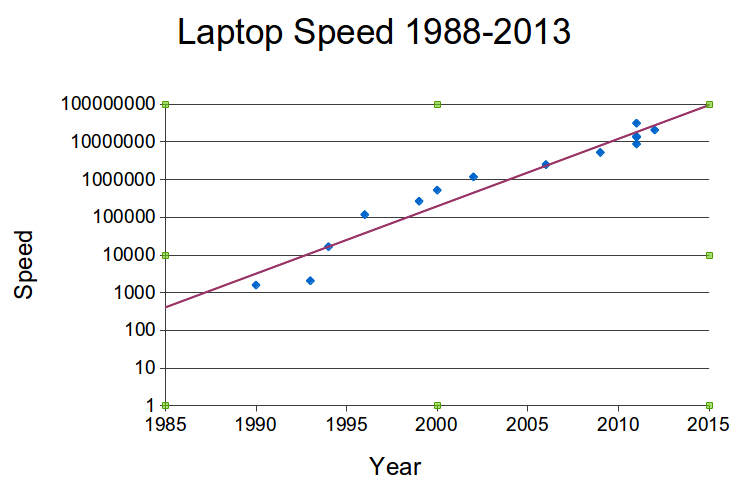
OK, so we all know Moore's Law now.
But often people don't understand its true effects.
Take a piece of paper, divide it in two, and write this year's date in one half:
Now divide the other half in two vertically, and write the date 18 months ago in one half:
Now divide the remaining space in half, and write the date 18 months earlier (or in other words 3 years ago) in one half:
Repeat until your pen is thicker than the space you have to divide in two:
This demonstrates that your current computer is more powerful than all other computers you have had put together.
(You can use this diagram to demonstrate other things too).
Amazingly, networks get faster even faster than Moore's law! They double in speed (at constant cost) every year!
As I said, the first internet connection in the Netherlands was a 64kb/s connection. A year later it was doubled to 128Kb/s.
But that is exactly the increase we should have expected!
Well, if that is true, the speed at Amsterdam now should be 64kb/s × 225 which is 2Tb/s.
So let's have a look at AMSIX's statistics from last week:
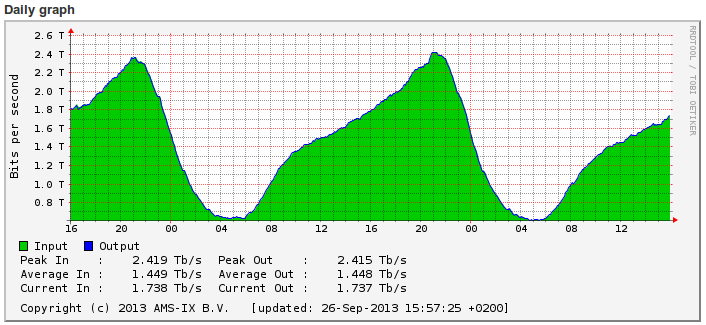
Yep! 2Tb/s!
So since 1988, computers have got 130 000 times faster, but the internet 33 554 432 times faster...
Until the introduction of printing, books were rare, and very, very expensive, maybe something like the same price as a small farm.
Only very rich people, and rich institutions, owned books.
The first Universities were set up before printing, and if you were a student, the price for borrowing a book was copying it. Usually book lenders only lent you part of the book at a time, to speed up the copying.
The other producers of books were the monasteries.

"When the Anglo-Saxon Monkwearmouth-Jarrow Abbey planned to create three copies of the bible in 692—of which one survives—the first step necessary was to plan to breed the cattle to supply the 1,600 calves to give the skin for the vellum required."
Producing books was slow, expensive, time-consuming, and tedious, as evinced by some of the remarks written by monks that have survived in the margins of manuscripts:
Oh, my hand.
Thank God it will soon be dark.
Writing is excessive drudgery. It crooks your back, it dims your sight, it twists your stomach, and your sides.
St Patrick of Armagh, deliver me from writing.
As the harbour is welcome to the sailor, so is the last line to the scribe.
Now I've written the whole thing: for Christ's sake give me a drink.
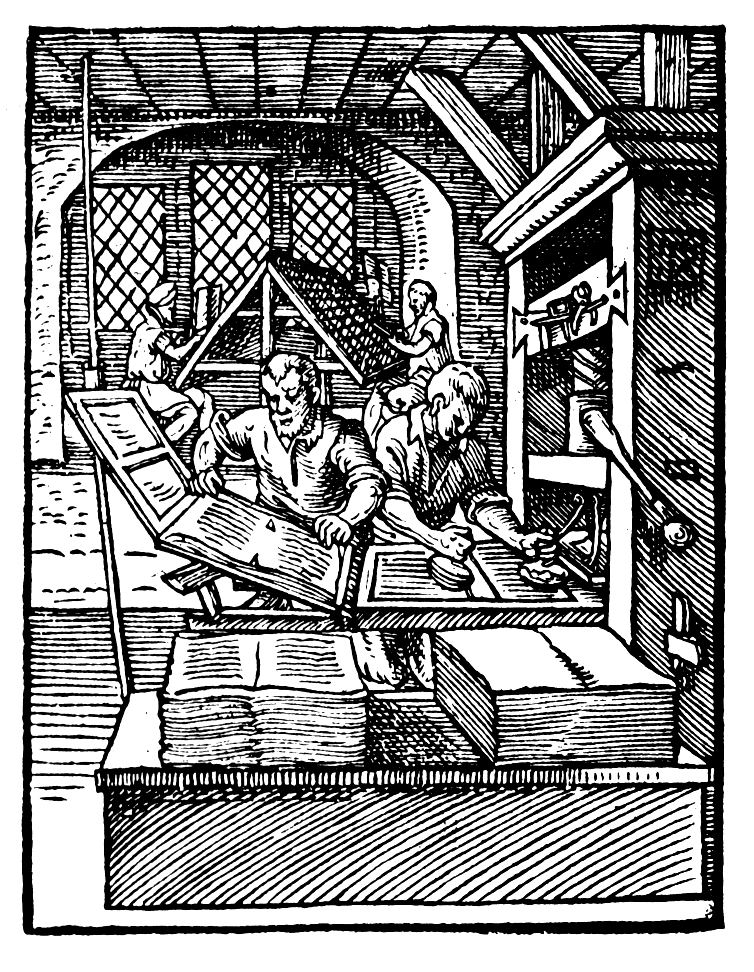
Gutenberg brought known technologies together (just like the web did): ink, paper, wine presses, movable type.

Note how it imitates a manuscript.
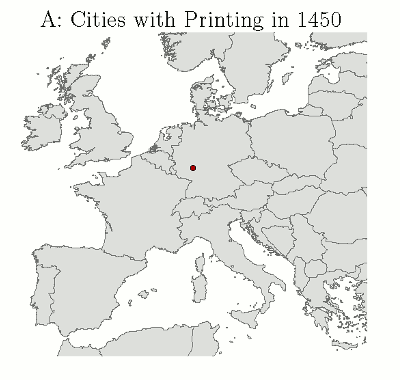
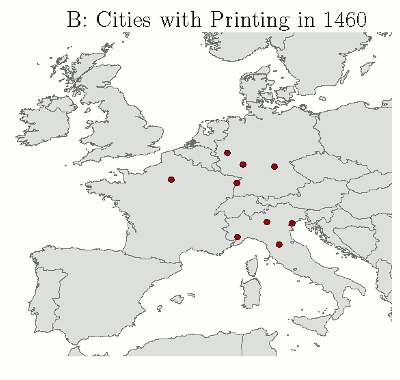
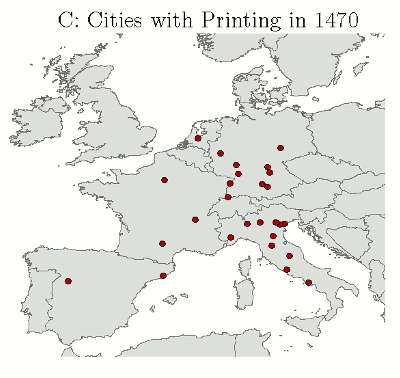
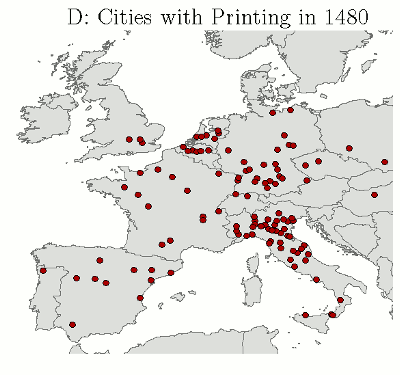
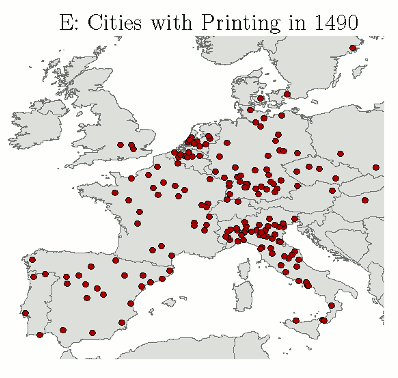
By 1500 there were 1000 printing shops in Europe, which had produced 35,000 titles and 20 million copies.
Price of books greatly diminished (First bible 300 florins, about 3 years wages for a clerk).
Books became a new means of distribution of information.
It was a paradigm shift - new industries, bookshops, newspapers.
Many ascribe the enlightenment to the availability of books.
1665: first scientific journals French Journal des Sçavans and the British Philosophical Transactions
From then on the number of scientific journals doubled every 15 years, right into the 20th century (exponential growth).
Even as late as the 1970's if you had said "there has to come a new way of distributing information to support this growth", they would have thought you crazy, more likely expecting the growth to end.
But now that we have the internet, the amount of information produced continues to increase at an exponential rate (doubling every three years according to one report, every 11 hours according to a newer one).
In 1988, phoning long-distance was expensive, and the further you phoned, the more expensive it was. People considered it reasonable, because it matched their expectations.
In fact, the expensive part is the local loop: only one person (you) is using that. The long-distance part can be amortised over 1000's of calls.
The internet made this all to clear: going to a site in New York is no more expensive than going to one locally (and now, phoning Amsterdam-New York is even cheaper than phoning Amsterdam-Amsterdam!)
Tim Berners-Lee (and Robert Caillau) created the Web at Cern
Just like Gutenberg with the printing press, they brought together many existing technologies (Hypertext, the internet, MIME types) and created a cohesive whole.
And frankly, the Web is replacing the Book (along with many other things).
Telephone directories, encyclopaedias, train timetables, other reference works are already gone. Most others will follow. Books (as an artefact) are about to become a niche market. All information will be web-based.
That is why it is of utmost importance that we plan properly.
Typically people expect that we will use new technologies in the same way we use existing ones.
Steam engines in factories: there was one engine, with lots of pulleys to distribute the power over the factory.
It was assumed that the same would happen with electric engines: one engine in the house with pulleys taking the power to where you needed it.
In houses they thought there would be vacuum cleaner tube attachment points in every room, with one central motor in the basement doing the sucking...
Same with mainframe computers: it was assumed 5 would be enough. Why would people want personal computers? They don't need to do payrolls!
The first books looked like manuscripts.
The first cars looked like carriages.
First radio was like plays, actors still had to dress up.
And the Web is (still) imitating old media.
Interlinking of services
Data doesn't need to be human-readable; in fact it must be machine-readable.
If there is data, make it available! (Amsterdam fireservice has trouble finding out where there are roadworks).
Internet everywhere, lights, oven, your alarm clock: internet over the electric net, so that anything that plugs in can have a connection.
All communication via IP.
Everyone a publisher
Nothing unavailable
True costs - like the internet showed with long distance calls, so we will learn the true cost of content.
A lot of existing information is distributed by people who have concentrations of the means of distribution, and in fact that is the real reason they exist.
Music industry is healthy, record industry is not.
Old media struggling to retain ownership (compare region codes on DVDs)
A change in the means of distribution.
A change in the availability of information.
The end of the hit.
A paradigm shift
Make no mistake: we are at a turning point in history. The internet is going to have as great an effect on society as the book did, only much quicker.
Newspapers, music industry, books in trouble? Pah! Nothing. Just wait!
The means of distribution are changing hands.
"The classified ads (and stock market quotations) are the bedrock of the press. Should an alternative form of easy access to such diverse daily information be found, the press will fold." Marshall McLuhan, "Understanding Media", 1964
"We tend to overestimate the effect of a technology in the short run and underestimate the effect in the long run." Roy Amara, The Institute for the Future